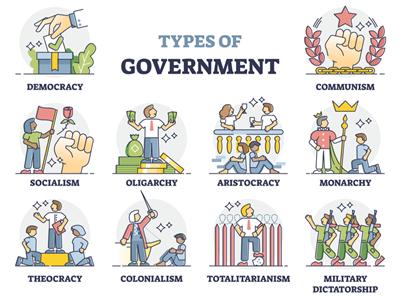
PUMPA - SMART LEARNING
எங்கள் ஆசிரியர்களுடன் 1-ஆன்-1 ஆலோசனை நேரத்தைப் பெறுங்கள். டாப்பர் ஆவதற்கு நாங்கள் பயிற்சி அளிப்போம்
Book Free DemoIn this lesson, we are going to learn how various forms of government have developed globally. Today, many countries worldwide follow different types of government, but the modern world prefers democracy. Let us learn about
- The forms of government
- The meaning of democracy
- The merits and demerits of democracy
- The challenges to Indian democracy
Forms of Government:
The governance of nations differs significantly based on who has power.
Aristocracy
A form of government in which power is in the hands of a small privileged ruling class (nobels).
Example: United Kingdom, Spain
A form of government in which power is in the hands of a small privileged ruling class (nobels).
Example: United Kingdom, Spain
Monarchy
A system of government in which one person reigns supreme, usually a king or queen(constitutional monarchy).
Example: Bhutan, Oman, Qatar
A system of government in which one person reigns supreme, usually a king or queen(constitutional monarchy).
Example: Bhutan, Oman, Qatar
Autocracy
A system of government by one person with absolute power.
Example: North Korea, Saudi Arabia
A system of government by one person with absolute power.
Example: North Korea, Saudi Arabia
Oligarchy
A small group of people having control of a country or organisation.
Example: Former Soviet Union, China, Venezuela, North Korea.
A small group of people having control of a country or organisation.
Example: Former Soviet Union, China, Venezuela, North Korea.
Theocracy
A system of government in which religious doctrines form the basis of government, headed by a priest who rules in the name of God or proclaims himself as a God.
Example: Vatican
A system of government in which religious doctrines form the basis of government, headed by a priest who rules in the name of God or proclaims himself as a God.
Example: Vatican
Democracy
A system of government in which eligible members in the population vote to elect their representatives, and the party or individual who obtains the majority votes forms the government. Example: India, USA, France
A system of government in which eligible members in the population vote to elect their representatives, and the party or individual who obtains the majority votes forms the government. Example: India, USA, France
Republic
A system of government in which supreme power is held by the people and their elected representatives and which has an elected or nominated President rather than a monarch.
Example: India, Australia
A system of government in which supreme power is held by the people and their elected representatives and which has an elected or nominated President rather than a monarch.
Example: India, Australia
The term 'republic' was first coined in 500\ BCE in Rome. It is derived from respublica, a Latin word meaning public matter.
India became a Republic on 26\ January 1950. India is governed following the Constitution adopted on 26\ November 1949, which came into force on 26\ January 1950.
India became a Republic on 26\ January 1950. India is governed following the Constitution adopted on 26\ November 1949, which came into force on 26\ January 1950.